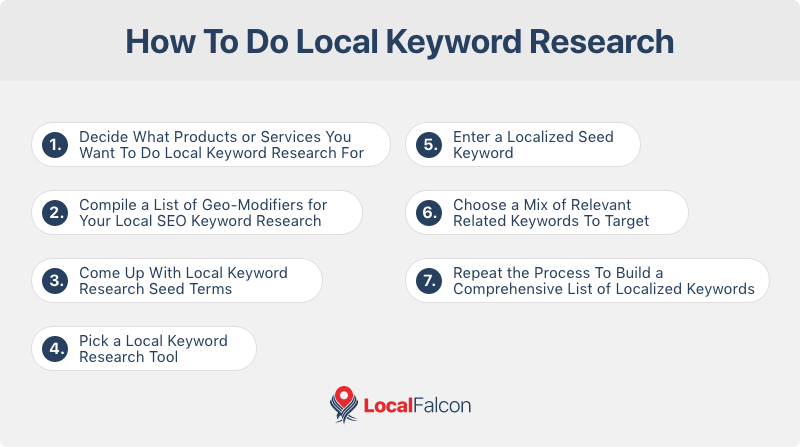Knowing how to do local keyword research is fundamental to any local SEO strategy. By identifying the specific search terms your potential customers use to find products and services in your area, you can create targeted content that improves your visibility in local search results.
Whether you're a business owner, a marketer, or an SEO professional, understanding how to do keyword research for local SEO effectively will help you attract more customers, outshine competitors, and maximize your online presence.
In this guide, we'll break down how to do local SEO keyword research step-by-step to help you build a list of localized keywords and leverage them to grow your business!

How To Do Local Keyword Research
1. Decide What Products or Services You Want To Do Local Keyword Research For
The first step towards building a list of localized keywords to target is to determine what products or services you want to find keywords for. A good way to start with this is to look at your Google Business Profile categories and build off of those.
For example, if you're doing local keyword research for a dentist, your categories will probably include at least a few of the following, depending on the specific services the dental clinic offers: "dentist," "dental clinic," "dental implants," "emergency dental service," "pediatric dentist," and "cosmetic dentist." All of the business's selected categories represent products or services you will want to find localized keywords for.
It's important to note that Google Business Profile doesn't usually offer categories for every single product or service a business may offer, so you'll have to use your own knowledge of what the business offers to keep brainstorming. For instance, if the dentist's office you're doing local SEO keyword research offers dental cleanings, teeth whitening, and sedation dentistry, these would be additional services to target.
Local Falcon Pro Tip: Use the Suggested Keywords feature to get instant recommendations for product/service-related keywords based on your GBP categories, search terms people are using to find your business, and AI-powered suggestions.
2. Compile a List of Geo-Modifiers for Your Local SEO Keyword Research
Next, you'll need to make a list of all the potential geo-modifiers, or place names specific to geographic areas you're targeting, that people might use when looking for nearby products or services.
Some of these will be obvious, like the names of the city and neighborhood the business you're doing local keyword research for is located in. But you'll also want to include any other colloquial geo-modifiers that people might use, such as a shortened version of the city's name or informal names for neighborhoods or commercial areas.
For example, let's say the dentist you're doing keyword research for is located in the Warehouse District in Minneapolis, Minnesota, a specific commercial district in downtown Minneapolis. In this case, your list of geo-modifiers might look something like this:
- "Minneapolis" (formal city name)
- "MPLS" (common abbreviation for Minneapolis)
- "MPLS Warehouse District" (commercial district where the dentist's office is)
- "Downtown Minneapolis" (larger neighborhood where the dentist is located)
- "Twin Cities" (used to refer to the broader Minneapolis-Saint Paul metropolitan area).Â
3. Come Up With Local Keyword Research Seed Terms
Seed terms are keywords you'll enter into a keyword research tool to generate a list of localized keyword ideas. For local SEO keyword research, these are essentially just a combination of the products or services you want to target and geo-modifiers from the list you created in the step above.
Sticking with our Minneapolis-based dentist example, some examples of seed keywords would be "downtown Minneapolis dentist," "teeth cleaning MPLS warehouse district," and "Twin Cities cosmetic dentist."
4. Pick a Local Keyword Research Tool
Next, choose a local keyword research tool to use. You can check out our article on the best free keyword research tools to get some ideas!
Most of these tools function very similarly, but they can provide slightly different results and insights, since they pull and present data in different ways.
Ultimately, the tool you use comes down to personal preference, and you may even decide to use more than one to build a comprehensive list of localized keywords to target.
5. Enter a Localized Seed Keyword
After you've chosen a tool to use for your local SEO keyword research, enter one of the seed terms you came up with earlier into the tool and hit the search button. This will generate a list of similar keywords people actually search for, along with their estimated search volume and keyword difficulty (an approximation of how hard it is to rank pages and content for that keyword).
For instance, if you search for "downtown Minneapolis dentist," the list of related keywords you get back from the tool might include:
- "dentist downtown minneapolis"
- "dentist downtown minneapolis m"
- "dentist downtown minneapolis medical arts building"
- "best dentist downtown minneapolis"
- "dentist in downtown minneapolis"
- "dentist in downtown minneapolis mn"
- "dentist minneapolis downtown"
- "dentists downtown minneapolis"
- "dentists in downtown minneapolis"
- "downtown minneapolis dentist"
6. Choose a Mix of Relevant Related Keywords To Target
From a list like the one above, pick out all the relevant keywords and start building a list of localized keywords to target. In this example, you would probably want to pull out all of the keywords except for "dentist downtown Minneapolis Medical Arts Building​," unless the dentist you're doing local keyword research for is actually located in or near that specific building.
You can simply copy and paste the keywords you want to target into a spreadsheet, making sure to also include search volumes and keyword difficulties to help you prioritize keywords when you start building strategies and content around them. In general, keywords with higher traffic are more difficult to rank for, but also have the most potential to drive traffic and generate leads.
7. Repeat the Process To Build a Comprehensive List of Localized Keywords
Keep entering seed terms into your chosen local keyword research tool(s) and repeating the process of copying all the relevant ones over to your keyword list until you have a long list of real search terms people use.
This list will help guide your local SEO strategy's keyword targeting, particularly when it comes to creating locally relevant content and incorporating localized keywords throughout your website.

Turning Your Localized Keyword Research into Content Topics
Now that you know how to do local keyword research, you may be wondering what to do next. Well, after you've built a comprehensive list of localized keywords, the next step is to transform those keywords into actionable content topics.
This process allows you to effectively target local intent search queries while creating valuable resources for potential customers to build trust and establish your brand as an authority in your industry. The content you create should ideally be a mix of helpful informational articles, service pages, and maybe some FAQs to top it all off.
For example, a service page for "Cosmetic Dentistry in Minneapolis" could incorporate keywords like "best cosmetic dentist in Minneapolis" and "cosmetic dentistry Minneapolis." Or, you might create a blog post about the "Benefits of Teeth Whitening" and include keywords like "professional teeth whitening Minneapolis" and "teeth whitening Minneapolis."
To get more specific ideas of users' search intent that can help you come up with valuable content ideas, you can try entering a keyword into Google and looking at the autocomplete suggestions or into a search listening tool, like Answer the Public, which visualizes common search questions and suggested autocomplete searches.
For example, if you see that an autocomplete suggestion is "teeth whitening Minneapolis," you might add a FAQ like this to your website: "How much does teeth whitening in Minneapolis cost?"
Conclusion
Follow this step-by-step guide on how to do keyword research for local SEO to build a strong foundation for targeting the exact keywords your audience is searching for in your area.
And remember this: mastering local keyword research isn't just about understanding search terms; it's about using those insights to create a powerful local SEO strategy that drives traffic and generates leads.
With a well-researched list of localized keywords, you can craft content that resonates with local search intent, optimize your website and content for maximum visibility, and stay competitive in your market.
Make sure to continuously refine your approach, performing regular keyword research to stay on top of evolving search trends, and you'll ensure your local SEO strategy remains effective and keeps driving valuable results for your business!


